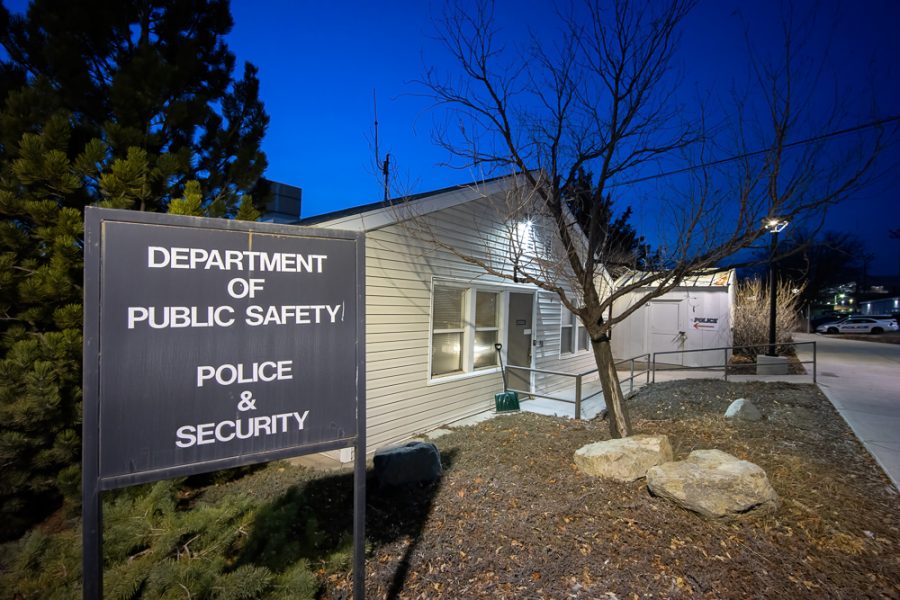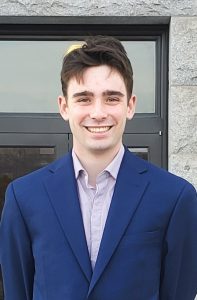Chief Safety Officer Marlon Lynch Announces Unexpected Departure From the U
The University of Utah Campus police department. Photographed on 10 Jan 2021. (Photo by Abu Asib | The Daily Utah Chronicle)
February 3, 2021
On Feb. 2, 2021, Marlon Lynch, the chief safety officer (CSO) at the University of Utah announced he will be leaving the U to serve as the inaugural vice president for public safety and chief of police at Michigan State University, his alma mater.
Lynch assumed his role at the U as the inaugural CSO in December 2019, to address concerns about safety issues on campus, to improve interdepartmental communication and to oversee new initiatives. Lynch will leave the U at the end of March.
Lynch’s Time at the U
The U released a statement about Lynch’s departure which listed several campus safety improvements implemented during his time as CSO.
“Two new public safety oversight committees also were established this year—a Public Safety Advisory Committee and an Independent Review Committee. They are comprised of students, faculty and staff from across the institution and are designed to ensure a broad representation of constituents are included in public safety decision-making,” the statement read.
In a statement addressed to his colleagues, Lynch said he felt mixed emotions about leaving the U.
“This new opportunity was unexpected, and my decision was not an easy one to make. In addition to enabling me to be closer to my family, I have deep connections to MSU, which is my alma mater and an institution attended by a number of my family members,” he said.
Rebecca Hardenbrook, the co-founder of UnsafeU, a student-led organization focused on raising awareness of campus safety issues, and a PhD student in applied mathematics said she has mixed feelings about Lynch’s departure. She said she believes he was making positive strides in making the department of public safety more accountable and transparent.
“I think that the biggest thing that Marlon offered that we have not seen from other administrators, and the person that was in that role before him, was the willingness to really be real with students,” she said.
Chris Nelson, the communications director for the U, said a large component of Lynch’s legacy is his work to reimagine the infrastructure for university safety.
“Part of this work was hiring a leadership team and elevating many positions to be peers to the director of U police, rather than reporting through the police department,” Nelson said. “This includes an executive officer position to oversee key committees and initiatives and director of administration, a director of community services, an emergency management director, a director of campus security who oversees accreditation and compliance, and a director of security for U Health.”
The Search
Cathy Anderson, the chief financial officer for the U, will be part of the leadership team responsible for choosing a new candidate for the position.
“It’ll be similar to the way we did it before: we will meet with campus representatives, faculty, staff, students and trustees to talk about what we will be looking for in a new chief safety officer,” Anderson said.
While Anderson told the Chronicle there is no timeline for the replacement process, the statement released by the U said it will begin later this year, after a replacement for Watkins is found.
Anderson said when the new search committee forms they will be looking for someone with experience across all areas of campus safety, including policing and mental health.
“We will have students involved. We had students last time and we will have them again,” Anderson said.
UnsafeU released a statement about Lynch’s departure. Similar to their demands for Watkins’ replacement, they hope the search committee for the next CSO will include BIPOC (Black, Indigenous, and people of color) and graduate students.
“Probably also someone who has a lot of experience working with survivors of sexual assault and racial bias and harassment and having good training,” Hardenbrook said. “So that we’re making sure that we don’t have a Keith Squires-esque type situation in that leadership position.”
Hardenbrook said she does not want Keith Squires to be the interim CSO because of his mishandling of the independent investigation after the murder of Lauren McCluskey.
“I personally am highly concerned about his ability to lead that department, while maintaining any sense of accountability or transparency, which we were just sort of starting to finally make some steps in renewing at the U,” she said.
However, Chris Nelson said Squires is fit for the position.
“As Marlon said in his statement, Keith is an experienced leader in law enforcement and well-positioned to keep things moving forward during the interim period,” Nelson said.
Hardenbrook is also concerned about the unexpected departure of people in high-level positions at the U. First, with the leave of absence of former Chief of University Police Rodney Chatman, then the resignation of President Watkins and now the departure of CSO Lynch.
“In Marlon’s case, I am worried that maybe there were a lot of barriers put in place by the ‘Old Guard’ of the administration, in terms of truly making the university transparent,” she said.
In an exclusive statement to the Chronicle, ASUU President Ephraim Kum praised the work Lynch did to increase student involvement in security decisions, such as having students chair the newly established Public Safety Advisory Committee.
“As an African American man, it did mean a lot seeing someone from a similar background as me being trusted with such a calling, as we are aware senior leadership at our institution hasn’t always been a beacon of diverse membership,” Kum said.
Kum also said it was the expectation of ASUU for the process of choosing the next CSO to be inclusive of students and carried out in an accessible, transparent manner.
“Safety and trust go hand in hand and we as an institution must always strive to pursue both, in all aspects,” Kum said.
Hardenbrook recognized the necessity of the role of the CSO and wants Lynch’s replacement to model his willingness to work with students and efforts towards full transparency.
“I definitely think we need someone who will be a champion in terms of unearthing sort of the ugly, rotten aspects of our university that I think might be a root cause of a lot of the critical safety issues that we’re seeing,” she said.









